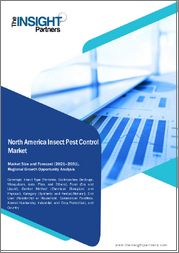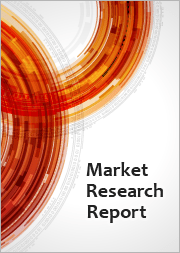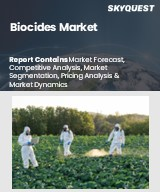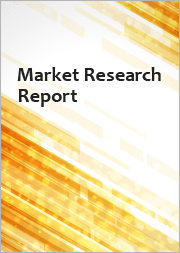
|
시장보고서
상품코드
1804897
북미의 해충 방제 시장 규모와 예측(2021-2031년) - 동향, 성장 기회 분석 보고서 : 해충 유형별, 형태별, 방제 방법별, 카테고리별, 최종 사용자별, 국가별North America Insect Pest Control Market Size and Forecast 2021 - 2031, Trend, and Growth Opportunity Analysis Report Coverage : by Insect Type, Form, Control Method, Category, End User, and Country |
||||||
북미의 해충 방제 시장 규모는 2024년에 38억 5,000만 달러로 평가되었고, 2031년까지는 55억 6,000만 달러에 이를 것으로 예측되며, 2025년부터 2031년까지의 CAGR은 5.4%를 나타낼 것으로 예상되고 있습니다.
건강 리스크에 대한 의식 증가와 공중보건 우려, 특히 주택, 상업시설, 공공공간에서의 중재 질환 및 만연 발생률의 상승이 북미의 해충 방제 시장을 견인하고 있습니다. 미국 질병 예방관리센터(CDC)와 캐나다 보건부 등의 행정기관은 라임병, 웨스트나일바이러스병, 지카바이러스 감염, 뎅기열 등 곤충이 원인이 되는 감염증의 만연을 완화하기 위한 노력을 강화하고 있으며, 그 결과 북미 국가의 주와 지방에서 환자가 증가하고 있습니다. 예를 들어 2023년 CDC는 미국에서는 2004년 이후 모기와 진드기가 중재하는 감염이 3배로 증가했다고 보고했으며, 연방 또는 지방 수준에서 해충 방제에 대한 긴급 투자를 촉진했습니다. 다양한 공중보건기관은 안전하고 효과적인 해충제제를 지역사회에 계몽하기 위해 종합적 해충관리(IPM)의 실천과 대상범위를 확대한 계발캠페인을 추진하고 있습니다. 미국 환경보호청(EPA)은 연방 살충·살균·살서제법(FIFRA)에 근거하여 농약의 등록과 사용을 규제하고 시장에 나오는 제품이 건강과 안전 기준을 충족하고 있음을 보증함으로써 이러한 노력을 지원하고 있습니다. 마찬가지로 캐나다 보건부의 해충 방제 규제청(PMRA)은 저독성 대체 해충 방제제를 우선적으로 평가하는 과정을 강화하고 친환경 제품에 대한 수요를 지원합니다.
북미 전역에서 시정촌이 지역 구루미의 해충 방제 프로그램을 시작했습니다. 예를 들어 2024년, 뉴욕시 보건국은 모기의 감시 프로그램을 확대하고, 서쪽 나일 바이러스의 발생을 억제하기 위해, 강력한 배수구나 공공의 공원에서 유충 구제 치료를 전개했습니다. 이러한 적극적인 위생 대책은 질병 예방에 대한 소비자의 의식이 높아짐에 따라 전문 해충 방제 서비스와 DIY 제품 수요를 밀어 올리고 있습니다. 공중 보건 정책, 규제에 대한 경계, 북미 소비자의 위험 인지 증가의 융합은 혁신적이고 컴플라이언스를 준수하는 해충 제거 솔루션 시장 성장을 가속화하고 있습니다.
인공지능(AI)과 사물인터넷(IoT)과 IPM의 융합은 북미의 해충 방제 시장을 크게 바꿀 기회로 부상하고 있습니다. 미국 농무부(USDA)의 국립 식품 농업 연구소는 AI를 중심으로 한 IPM 조사, 예를 들어 FACT-AI에 수백만 달러의 자금을 제공합니다. 한편, EPA-USDA의 바이오 농약 실증 프로젝트는 경쟁 보조금을 통해 IPM에서 생물 방제제의 채택을 장려하고 있습니다. 또한 Farmonaut는 아이오와 주 농부와 협력하여 AI 주도 IoT 카메라 네트워크 'InsectNet'의 활용을 지원하고 실시간으로 농장 해충을 식별하여 즉시 데이터 주도 해충 제거를 가능하게 합니다. 마찬가지로 식용 식물 농부에게 즉시 통보하는 AI 구동 스마트 트랩의 개발은 농부들이 적극적인 해충을 제거하고 오염 위험을 감소시킵니다. 이러한 머신러닝과 센서를 통합한 스마트 트랩은 현대 IPM의 기본적인 측면인 대응 시간과 노동 장벽을 삭감하고 있습니다.
북미의 해충 방제 시장에서 사업을 전개하고 있는 주요 기업으로는 Arkion Life Sciences, Thermacell, SC Johnson and Son Inc, Eleeo brands, Intec Pharmacal Inc, 3M Co, EarthKind, Spectrum Brands Inc, Henkel AG&Co KGaA, Reckitt Bencki 등이 있습니다. 이 회사들은 혁신적인 제품을 저렴한 가격으로 제공하고 많은 소비자를 유치하고 있습니다.
북미 전체의 해충 방제 시장 규모는 1차 정보와 2차 정보를 모두 이용하여 산출하였습니다. 조사 과정를 시작할 때 시장에 관한 질적·양적 정보를 입수하기 위해 사내외의 출처를 이용하여 철저한 2차 조사를 실시했습니다. 또한 데이터를 검증하고 주제에 대한 분석 인사이트를 얻기 위해 업계 관계자들에게 다수의 1차 인터뷰를 실시했습니다. 이 프로세스의 진출기업은 부사장, R&D 매니저, 마켓 인텔리전스 매니저, 국내 영업 매니저 등의 업계 전문가와 북미의 해충 방제 시장을 전문으로 하는 평가 전문가, 리서치 애널리스트, 키오피니언 리더 등 외부 컨설턴트를 포함합니다.
목차
제1장 서론
제2장 주요 요약
- 애널리스트 시장 전망
- 시장의 매력
제3장 조사 방법
- 2차 조사
- 1차 조사
- 가설의 책정
- 거시경제 요인분석
- 기초 수치의 개발
- 데이터의 삼각측량
- 국가 레벨 데이터
- 전제조건과 제한
제4장 해충 방제 시장 상황
- Porter's Five Forces 분석
- 미국의 무역 관세가 해충 방제 시장에 미치는 영향
- 미국과 중국의 무역
- 미국의 수출입 동향에 대한 영향
- 수입 동향
- 수출 동향
- 미국 소비자에 미치는 영향
- 주식시장에 미치는 영향
- 타국에 대한 영향
- 해충 방제 시장에 대한 영향
- 미국 제조업체에 대한 영향
- 해외 제조업체에 대한 영향
- 결론
- 생태계 분석
- 원재료
- 제조 공정
- 유통업체/공급자
- 최종 용도
- 공급망의 벤더 일람
제5장 북미의 해충 방제 시장 : 주요 시장 역학
- 북미의 해충 방제 시장 : 주요 시장 역학
- 시장 성장 촉진요인
- 건강 리스크 의식과 공중 보건에 대한 우려
- 급속한 도시화와 인구밀도의 상승
- 시장 성장 억제요인
- 효과적인 해충 방제 솔루션의 고비용
- 시장 기회
- 종합적 해충 관리에 있어서의 인공지능/사물의 인터넷의 통합
- 향후의 동향
- 생물학적이고 친환경적인 솔루션으로의 이동
- 성장 촉진요인과 저해요인의 영향
제6장 북미의 해충 방제 시장 분석
- 북미의 해충 방제 시장 수량과 예측(2021-2031년)
- 북미의 해충 방제 시장 수량 예측과 분석
- 북미의 해충 방제 시장 수익과 예측(2021-2031년)
- 북미의 해충 방제 시장 수익과 예측, 분석
제7장 북미의 해충 방제 시장 수량·수익 분석 : 곤충 유형별
- 흰개미
- 바퀴벌레
- 빈대
- 모기
- 개미
- 파리
- 기타
제8장 북미의 해충 방제 시장 수량·수익 분석 : 형태별
- 건식
- 액체
제9장 북미의 해충 방제 시장 수량·수익 분석 : 구제 방법별
- 화학적 방제
- 생물학적 방제
- 물리적
제10장 북미의 해충 방제 시장 수량·수익 분석 : 카테고리별
- 합성
- 허브/천연
제11장 북미의 해충 방제 시장 수량·수익 분석 : 최종 사용자별
- 주택/가정
- 상업 시설
- 축산
- 산업용
- 농작물 보호
제12장 북미의 해충 방제 시장 : 국가별 분석
- 북미
- 미국
- 캐나다
- 멕시코
제13장 경쟁 구도
- 히트 맵 분석 : 주요 기업별
- 기업 점유율 분석(2024년)
제14장 업계 정세
- 콜라보레이션
- 사업 확대
- 신규상시
- 기업 뉴스
제15장 기업 프로파일
- Arkion Life Sciences
- Thermacell
- Johnson and Son Inc
- Eleeo Brands
- Intec Pharmacal Inc
- 3M Co
- EarthKind
- Spectrum Brands, Inc.
- Henkel AG & Co KGaA
- Reckitt Benckiser Group Plc
제16장 부록
KTH 25.09.12The North America insect pest control market size was valued at US$ 3.85 billion in 2024 and is projected to reach US$ 5.56 billion by 2031; it is expected to register a CAGR of 5.4% from 2025 to 2031.
Increasing health risk awareness and public health concerns, particularly due to the rising incidence of vector-borne diseases and infestations across residential, commercial, and public spaces, drive the North America insect pest control market. Governing bodies such as the US Centers for Disease Control and Prevention (CDC), and Health Canada have intensified efforts to mitigate the spread of Lyme disease, West Nile virus disease, Zika virus infection, and Dengue, among other infections caused by insects, which have led to an increasing trajectory of cases across states and provinces in North American countries. For instance, in 2023, the CDC reported that cases of mosquito and tick-borne illnesses have tripled in the US since 2004, prompting urgent investment in pest control initiatives at both the federal and local levels. Various public health agencies promote integrated pest management (IPM) practices and public awareness campaigns with expanded coverage to educate communities on safe and effective pest control. The US Environmental Protection Agency (EPA) supports these efforts by regulating the registration and use of pesticides under the Federal Insecticide, Fungicide, and Rodenticide Act (FIFRA), ensuring that products available in the market meet health and safety standards. Similarly, Health Canada's Pest Management Regulatory Agency (PMRA) has reinforced the process of evaluation to prioritize low-toxicity pest control alternatives, supporting the demand for eco-conscious products.
Municipal governments have started launching community-wide vector control programs across North America. For example, in 2024, the New York City Department of Health expanded its mosquito surveillance program, deploying larvicide treatments in strong drains and public parks to curb West Nile virus outbreaks. These proactive health measures, combined with heightened consumer awareness about disease prevention, have boosted the demand for both professional pest control services and DIY products. The convergence of public health policies, regulatory vigilance, and increased risk perception among North American consumers continuous to accelerate market growth for innovative and compliant pest control solutions.
The convergence of artificial intelligence (AI) and the Internet of Things (IoT) with IPM is emerging as a game-changing opportunity in the North America insect pest control market. The USDA's National Institute of Food and Agriculture has funded millions in AI-centered IPM research studies, e.g., FACT-AI, which will equip growers with open-source pest identification and decision-support tools for small-grain systems. On the other hand, the EPA-USDA Biopesticides Demonstration Project incentivizes the adoption of biocontrol agents in IPM through competitive grants. Further, Farmonaut has collaborated with Iowa farmers to aid the utilization of "InsectNet," an AI-driven IoT camera network providing real-time field pest identification, allowing for instant, data-driven pest control action. Similarly, the development of AI-driven smart traps that instantly notify food plant farmers allows them to undertake active pest control, thereby lowering the risk of contamination. These machine learning and sensor-integrated smart traps are reducing response time and labor barriers, fundamental aspects of contemporary IPM.
Some of the key players operating in the North America insect pest control market are Arkion Life Sciences, Thermacell, SC Johnson and Son Inc, Eleeo brands, Intec Pharmacal Inc, 3M Co, EarthKind, Spectrum Brands Inc, Henkel AG & Co KGaA, and Reckitt Benckiser Group Plc. These players offer innovative products at affordable prices that attract a large number of consumers, opening new opportunities for them in the coming years.
The overall North America insect pest control market size has been derived using both primary and secondary sources. To begin the research process, exhaustive secondary research has been conducted using internal and external sources to obtain qualitative and quantitative information about the market. Also, multiple primary interviews have been conducted with industry participants to validate the data and gain analytical insights into the topic. Participants in this process include industry experts, such as VPs, business development managers, market intelligence managers, and national sales managers, along with external consultants, such as valuation experts, research analysts, and key opinion leaders, specializing in the North America insect pest control market.
Table Of Contents
1. Introduction
- 1.1 Report Guidance
- 1.2 Market Segmentation
2. Executive Summary
- 2.1 Analyst Market Outlook
- 2.2 Market Attractiveness
3. Research Methodology
- 3.1 Secondary Research
- 3.2 Primary Research
- 3.2.1 Hypothesis formulation:
- 3.2.2 Macro-economic factor analysis:
- 3.2.3 Developing base number:
- 3.2.4 Data Triangulation:
- 3.2.5 Country level data:
- 3.3 Assumptions and Limitations
4. Insect Pest Control Market Landscape
- 4.1 Overview
- 4.2 Porter's Five Forces Analysis
- 4.3 Impact of US Trade Tariff on Insect Pest Control Market
- 4.3.1 Trade between the US and China:
- 4.3.2 Impact on US Import-Export Trends:
- 4.3.2.1 Import Trends -
- 4.3.2.2 Export Trends -
- 4.3.3 Impact on the US Consumers:
- 4.3.4 Impact on the Stock Market:
- 4.3.5 Impact on Other Countries:
- 4.3.6 Impact on Insect Pest Control Market:
- 4.3.6.1 Impact on US Manufacturers -
- 4.3.6.2 Impact on International Manufacturers -
- 4.3.6.3 Conclusion
- 4.4 Ecosystem Analysis
- 4.4.1 Raw Materials:
- 4.4.2 Manufacturing Process:
- 4.4.3 Distributors/Suppliers:
- 4.4.4 End-Use Applications:
- 4.4.5 List of Vendors in the Supply Chain
5. North America Insect Pest Control Market - Key Market Dynamics
- 5.1 North America Insect Pest Control Market - Key Market Dynamics
- 5.2 Market Drivers
- 5.2.1 Health Risk Awareness and Public Health Concerns
- 5.2.2 Rapid Urbanization and Rising Population Density
- 5.3 Market Restraints
- 5.3.1 High Cost of Effective Insect Pest Control Solutions
- 5.4 Market Opportunities
- 5.4.1 Integration of Artificial Intelligence/Internet of Things in Integrated Pest Management
- 5.5 Future Trends
- 5.5.1 Shift to Biological and Eco-Friendly Solutions
- 5.6 Impact of Drivers and Restraints:
6. North America Insect Pest Control Market Analysis
- 6.1 North America Insect Pest Control Market Volume and Forecast (Tons), 2021-2031
- 6.2 North America Insect Pest Control Market Volume Forecast and Analysis (Tons)
- 6.3 North America Insect Pest Control Market Revenue and Forecast (US$ Million), 2021-2031
- 6.4 North America Insect Pest Control Market Revenue Forecast and Analysis (US$ Million)
7. North America Insect Pest Control Market Volume and Revenue Analysis - by Insect Type
- 7.1 Termites
- 7.1.1 Overview
- 7.1.2 Termites: North America Insect Pest Control Market - Volume and Forecast, 2021-2031 (Tons)
- 7.1.3 Termites: North America Insect Pest Control Market - Revenue and Forecast, 2021-2031 (US$ Million)
- 7.2 Cockroaches
- 7.2.1 Overview
- 7.2.2 Cockroaches: North America Insect Pest Control Market - Volume and Forecast, 2021-2031 (Tons)
- 7.2.3 Cockroaches: North America Insect Pest Control Market - Revenue and Forecast, 2021-2031 (US$ Million)
- 7.3 Bedbugs
- 7.3.1 Overview
- 7.3.2 Bedbugs: North America Insect Pest Control Market - Volume and Forecast, 2021-2031 (Tons)
- 7.3.3 Bedbugs: North America Insect Pest Control Market - Revenue and Forecast, 2021-2031 (US$ Million)
- 7.4 Mosquitoes
- 7.4.1 Overview
- 7.4.2 Mosquitoes: North America Insect Pest Control Market - Volume and Forecast, 2021-2031 (Tons)
- 7.4.3 Mosquitoes: North America Insect Pest Control Market - Revenue and Forecast, 2021-2031 (US$ Million)
- 7.5 Ants
- 7.5.1 Overview
- 7.5.2 Ants: North America Insect Pest Control Market - Volume and Forecast, 2021-2031 (Tons)
- 7.5.3 Ants: North America Insect Pest Control Market - Revenue and Forecast, 2021-2031 (US$ Million)
- 7.6 Flies
- 7.6.1 Overview
- 7.6.2 Flies: North America Insect Pest Control Market - Volume and Forecast, 2021-2031 (Tons)
- 7.6.3 Flies: North America Insect Pest Control Market - Revenue and Forecast, 2021-2031 (US$ Million)
- 7.7 Others
- 7.7.1 Overview
- 7.7.2 Others: North America Insect Pest Control Market - Volume and Forecast, 2021-2031 (Tons)
- 7.7.3 Others: North America Insect Pest Control Market - Revenue and Forecast, 2021-2031 (US$ Million)
8. North America Insect Pest Control Market Volume and Revenue Analysis - by Form
- 8.1 Dry
- 8.1.1 Overview
- 8.1.2 Dry: North America Insect Pest Control Market - Volume and Forecast, 2021-2031 (Tons)
- 8.1.3 Dry: North America Insect Pest Control Market - Revenue and Forecast, 2021-2031 (US$ Million)
- 8.2 Liquid
- 8.2.1 Overview
- 8.2.2 Liquid: North America Insect Pest Control Market - Volume and Forecast, 2021-2031 (Tons)
- 8.2.3 Liquid: North America Insect Pest Control Market - Revenue and Forecast, 2021-2031 (US$ Million)
9. North America Insect Pest Control Market Volume and Revenue Analysis - by Control Method
- 9.1 Chemical
- 9.1.1 Overview
- 9.1.2 Chemical: North America Insect Pest Control Market - Revenue and Forecast, 2021-2031 (US$ Million)
- 9.2 Biological
- 9.2.1 Overview
- 9.2.2 Biological: North America Insect Pest Control Market - Revenue and Forecast, 2021-2031 (US$ Million)
- 9.3 Physical
- 9.3.1 Overview
- 9.3.2 Physical: North America Insect Pest Control Market - Revenue and Forecast, 2021-2031 (US$ Million)
10. North America Insect Pest Control Market Volume and Revenue Analysis - by Category
- 10.1 Synthetic
- 10.1.1 Overview
- 10.1.2 Synthetic: North America Insect Pest Control Market - Volume and Forecast, 2021-2031 (Tons)
- 10.1.3 Synthetic: North America Insect Pest Control Market - Revenue and Forecast, 2021-2031 (US$ Million)
- 10.2 Herbal/Natural
- 10.2.1 Overview
- 10.2.2 Herbal/Natural: North America Insect Pest Control Market - Volume and Forecast, 2021-2031 (Tons)
- 10.2.3 Herbal/Natural: North America Insect Pest Control Market - Revenue and Forecast, 2021-2031 (US$ Million)
11. North America Insect Pest Control Market Volume and Revenue Analysis - by End User
- 11.1 Residential/Household
- 11.1.1 Overview
- 11.1.2 Residential/Household: North America Insect Pest Control Market - Volume and Forecast, 2021-2031 (Tons)
- 11.1.3 Residential/Household: North America Insect Pest Control Market - Revenue and Forecast, 2021-2031 (US$ Million)
- 11.2 Commercial Facilities
- 11.2.1 Overview
- 11.2.2 Commercial Facilities: North America Insect Pest Control Market - Volume and Forecast, 2021-2031 (Tons)
- 11.2.3 Commercial Facilities: North America Insect Pest Control Market - Revenue and Forecast, 2021-2031 (US$ Million)
- 11.3 Animal Husbandry
- 11.3.1 Overview
- 11.3.2 Animal Husbandry: North America Insect Pest Control Market - Volume and Forecast, 2021-2031 (Tons)
- 11.3.3 Animal Husbandry: North America Insect Pest Control Market - Revenue and Forecast, 2021-2031 (US$ Million)
- 11.4 Industrial
- 11.4.1 Overview
- 11.4.2 Industrial: North America Insect Pest Control Market - Volume and Forecast, 2021-2031 (Tons)
- 11.4.3 Industrial: North America Insect Pest Control Market - Revenue and Forecast, 2021-2031 (US$ Million)
- 11.5 Crop Protection
- 11.5.1 Overview
- 11.5.2 Crop Protection: North America Insect Pest Control Market - Volume and Forecast, 2021-2031 (Tons)
- 11.5.3 Crop Protection: North America Insect Pest Control Market - Revenue and Forecast, 2021-2031 (US$ Million)
12. North America Insect Pest Control Market - Country Analysis
- 12.1 North America
- 12.1.1 North America Insect Pest Control Market Breakdown, by Countries
- 12.1.2 North America Insect Pest Control Market - Revenue and Forecast Analysis - by Country
- 12.1.2.1 North America Insect Pest Control Market - Volume and Forecast Analysis - by Country
- 12.1.2.2 North America Insect Pest Control Market - Revenue and Forecast Analysis - by Country
- 12.1.2.3 United States: Insect Pest Control Market - Revenue and Forecast, 2021-2031 (US$ Million)
- 12.1.2.3.1 United States: Insect Pest Control Market Breakdown, by Insect Type
- 12.1.2.3.2 United States: Insect Pest Control Market Breakdown, by Form
- 12.1.2.3.3 United States: Insect Pest Control Market Breakdown, by Control Method
- 12.1.2.3.4 United States: Insect Pest Control Market Breakdown, by Category
- 12.1.2.3.5 United States: Insect Pest Control Market Breakdown, by End User
- 12.1.2.4 Canada: Insect Pest Control Market - Revenue and Forecast, 2021-2031 (US$ Million)
- 12.1.2.4.1 Canada: Insect Pest Control Market Breakdown, by Insect Type
- 12.1.2.4.2 Canada: Insect Pest Control Market Breakdown, by Form
- 12.1.2.4.3 Canada: Insect Pest Control Market Breakdown, by Control Method
- 12.1.2.4.4 Canada: Insect Pest Control Market Breakdown, by Category
- 12.1.2.4.5 Canada: Insect Pest Control Market Breakdown, by End User
- 12.1.2.5 Mexico: Insect Pest Control Market - Revenue and Forecast, 2021-2031 (US$ Million)
- 12.1.2.5.1 Mexico: Insect Pest Control Market Breakdown, by Insect Type
- 12.1.2.5.2 Mexico: Insect Pest Control Market Breakdown, by Form
- 12.1.2.5.3 Mexico: Insect Pest Control Market Breakdown, by Control Method
- 12.1.2.5.4 Mexico: Insect Pest Control Market Breakdown, by Category
- 12.1.2.5.5 Mexico: Insect Pest Control Market Breakdown, by End User
13. Competitive Landscape
- 13.1 Heat Map Analysis by Key Players
- 13.2 Company Market Share Analysis, 2024
14. Industry Landscape
- 14.1 Overview
- 14.2 Collaborations
- 14.3 Expansions
- 14.4 New Launch
- 14.5 Company News
15. Company Profiles
- 15.1 Arkion Life Sciences
- 15.1.1 Key Facts
- 15.1.2 Business Description
- 15.1.3 Products and Services
- 15.1.4 Financial Overview
- 15.1.5 SWOT Analysis
- 15.1.6 Key Developments
- 15.2 Thermacell
- 15.2.1 Key Facts
- 15.2.2 Business Description
- 15.2.3 Financial Overview
- 15.2.4 Products and Services
- 15.2.5 SWOT Analysis
- 15.2.6 Key Developments
- 15.3 Johnson and Son Inc
- 15.3.1 Key Facts
- 15.3.2 Business Description
- 15.3.3 Products and Services
- 15.3.4 Financial Overview
- 15.3.5 SWOT Analysis
- 15.3.6 Key Developments
- 15.4 Eleeo Brands
- 15.4.1 Key Facts
- 15.4.2 Business Description
- 15.4.3 Products and Services
- 15.4.4 Financial Overview
- 15.4.5 SWOT Analysis
- 15.4.6 Key Developments
- 15.5 Intec Pharmacal Inc
- 15.5.1 Key Facts
- 15.5.2 Business Description
- 15.5.3 Products and Services
- 15.5.4 Financial Overview
- 15.5.5 SWOT Analysis
- 15.5.6 Key Developments
- 15.6 3M Co
- 15.6.1 Key Facts
- 15.6.2 Business Description
- 15.6.3 Products and Services
- 15.6.4 Financial Overview
- 15.6.5 SWOT Analysis
- 15.6.6 Key Developments
- 15.7 EarthKind
- 15.7.1 Key Facts
- 15.7.2 Business Description
- 15.7.3 Products and Services
- 15.7.4 Financial Overview
- 15.7.5 SWOT Analysis
- 15.7.6 Key Developments
- 15.8 Spectrum Brands, Inc.
- 15.8.1 Key Facts
- 15.8.2 Business Description
- 15.8.3 Products and Services
- 15.8.4 Financial Overview
- 15.8.5 SWOT Analysis
- 15.8.6 Key Developments
- 15.9 Henkel AG & Co KGaA
- 15.9.1 Key Facts
- 15.9.2 Business Description
- 15.9.3 Products and Services
- 15.9.4 Financial Overview
- 15.9.5 SWOT Analysis
- 15.9.6 Key Developments
- 15.10 Reckitt Benckiser Group Plc
- 15.10.1 Key Facts
- 15.10.2 Business Description
- 15.10.3 Products and Services
- 15.10.4 Financial Overview
- 15.10.5 SWOT Analysis
- 15.10.6 Key Developments
16. Appendix
- 16.1 About The Insight Partners



















